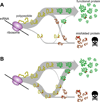The evolutionary consequences of erroneous protein synthesis
- PMID: 19763154
- PMCID: PMC2764353
- DOI: 10.1038/nrg2662
The evolutionary consequences of erroneous protein synthesis
Abstract
Errors in protein synthesis disrupt cellular fitness, cause disease phenotypes and shape gene and genome evolution. Experimental and theoretical results on this topic have accumulated rapidly in disparate fields, such as neurobiology, protein biosynthesis and degradation and molecular evolution, but with limited communication among disciplines. Here, we review studies of error frequencies, the cellular and organismal consequences of errors and the attendant long-range evolutionary responses to errors. We emphasize major areas in which little is known, such as the failure rates of protein folding, in addition to areas in which technological innovations may enable imminent gains, such as the elucidation of translational missense error frequencies. Evolutionary responses to errors fall into two broad categories: adaptations that minimize errors and their attendant costs and adaptations that exploit errors for the organism's benefit.
Figures



References
-
- Ogle JM, Ramakrishnan V. Structural insights into translational fidelity. Annu. Rev. Biochem. 2005;74:129–177. - PubMed
-
-
Lee JW, et al. Editing-defective tRNA synthetase causes protein misfolding and neurodegeneration. Nature. 2006;443:50–55. Global mistranslation-induced protein misfolding leads to cell-type-specific neurodegeneration in a mouse. A exciting study that links the fidelity of translation to a disease phenotype.
-
-
- Rubinstein E. Misincorporation of the proline analog azetidine-2-carboxylic acid in the pathogenesis of multiple sclerosis: a hypothesis. J. Neuropathol. Exp. Neurol. 2008;67:1032–1034. - PubMed
-
-
Drummond DA, Wilke CO. Mistranslation-induced protein misfolding as a dominant constraint on coding-sequence evolution. Cell. 2008;134:341–352. A bioinformatics and modeling study demonstrating that genome-wide patterns of molecular evolution are shared from bacteria to mammals. The study also showed that in a simple model of protein evolution selection against mistranslation-induced protein misfolding is sufficient to reproduce these patterns.
-
Publication types
MeSH terms
Grants and funding
LinkOut - more resources
Full Text Sources
Other Literature Sources

